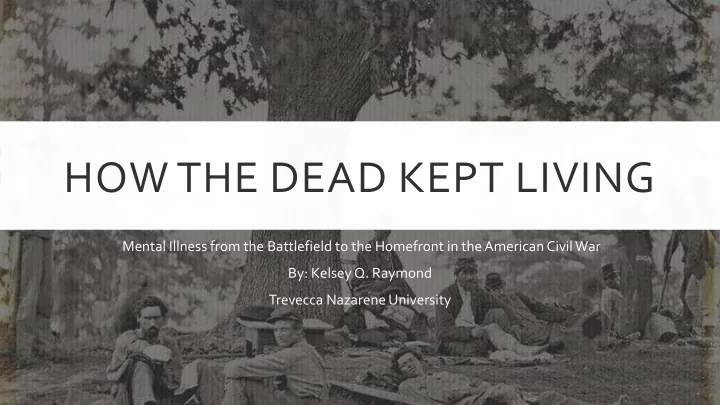

HOW THE DEAD KEPT LIVING Mental Illness from the Battlefield to the Homefront in the American Civil War By: Kelsey Q. Raymond Trevecca Nazarene University
THE HORRORS AND TRAUMAS OF THE CIVIL WAR • At the end of the American Civil War about 620,000 lives were lost. • Mass bloodshed= A change in Men and Women’s Identity and their psyche. • Men’s Identity Shift: harrowing conditions, mass violence, disease, killing, and being surrounded by death • Women’s Identity Shift: anxiety of loved ones never returning, starvation, loss of homes, newly acquired independence. • Civil War Conditions= Symptoms of psychological trauma as evidenced through letters and diaries.
IDENTITY IN FLUX: SOLDIERS Killing and Mass Violence: Disassociating and Numbness Suicide Case Study: John Roland Key Words/Indicators of symptoms of Mental Illness: combat fatigue, soldier’s heart, heart irritability, nostalgia, and in some cases acute mania. Even less specific terms for their feelings were used such as, “…phrases such as ‘the blues,’ ‘lonesome,’ ‘disheartened,’ ‘downhearted,’ ‘discouraged,’ ‘demoralized,’ ‘nervous,’…”
CASE STUDY: OLIVER CASWELL KING Born: August 4 th , 1841 in Virginia Parents: Leander Montgomery King and Penelope Louise Massengil King Family moved to Tennessee when Oliver was at a very young age Education: College Level Social: Falls in love with Katherine Rebecca Rutledge (King) Joins Confederate Army on June 6 th , 1861 as a private under Captain A.L. Gammon’s company, 19 th Tn. Infantry In June 1864, under Col. James Carter at the Battle of Piedmont, Oliver is life-threateningly injured and is taken prisoner. He lives, but walks with a cane the rest of his life.
IDENTITY IN FLUX: WOMEN Line Between Battlefield and Homefront blurred, particularly in the South. • Day to Day: Fear of destruction of property, starvation, work outside the domestic sphere different gender role expectations… (Emma Laconte, Case Study) • Identity in Flux Head of household/business+ primary decision maker+ protector + provider for family= self- hatred, anxiety, doubt, and grief of death of who they were. Key Words/ Indicator of symptoms of Mental Illness: Words such as “blues”, “painful”, “suffering”, “speechless agony”, “anger”, “torture”, “anxieties”, “poor heart”, “sorrow”, “misery”, “forlorn”, “resigned”, “unprotected”, “afraid”, “distressed”, “miserable”, “unbearable,” and “powerless”
CASE STUDY: RACHEL CARTER CRAIGHEAD Born: 1837 in Nashville Parents: Daniel F. Carter and Mary J. Buntin Carter Spouse: Marries Thomas D. Craighead in 1859 Journals her experience living in a Union occupied Nashville. Death of her Brother, John. Many arrests of her father. Evident symptoms of continues depression. “What a wilderness will life be these long, long dreary days, to us and what is there beyond. Nothing but desolation. Oh! They have killed my only Brother. Our dear soldier boy. I feel like I must die too.”
BIBLIOGRAPHY Primary Sources: Oliver Caswell King and Katherine Rebecca Rutledge King Papers, 1856-1893 , Tennessee State Library and Archives, http://sos.tn.gov/products/tsla/oliver-caswell-king-and-katherine-rebecca-rutledge-king-papers-1856-1893 LeConte, Emma, Earl Schenck Miers, and Anne Frior Scott. Ed. When the World Ended: The Diary of Emma LeConte. Lincoln: Univ. of Nebraska Press, 1987. Rachel Carter Craighead diaries, 1855-1911, Box 1, Stack 2, no. 89-92 my .661, Tennessee State Library and Archives. http://sostngovbuckets.s3.amazonaws.com/tsla/digital/teva/transcripts/36010.pdf Secondary Sources: Dean, Eric T. Shook over Hell: Post-traumatic Stress, Vietnam, and the Civil War. Cambridge, MA: Harvard University Press, 1997. Faust, Drew Gilpin. Mothers of Invention. NC: The University of North Carolina Press, 1996. Faust, Drew Gilpin. This Republic of Suffering: Death and the American Civil War. New York: Alfred A. Knopf, 2008. Lande, R. Gregory. "Felo De Se: Soldier Suicides in America's Civil War." Military Medicine 176, no.5 (05, 2011): 531-6. http://0search.proquest.com.library.trevecca.edu/docview/867824783?accountid=29083. Lande, R. Gregory. Psychological Consequences of the American Civil War. McFarland Publishing, 2017. Massey, Mary Elizabeth. Women in the Civil War. Lincoln, NE: University of Nebraska Press, 1994.
Recommend
More recommend